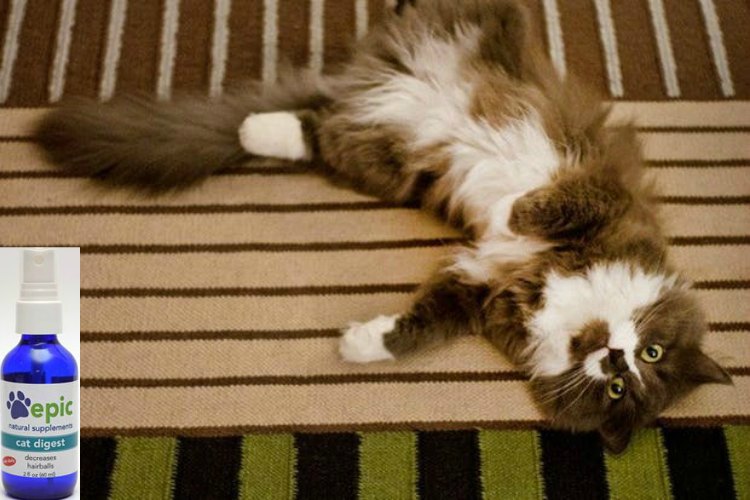
by Alissa Wolf
Pet digestive disorders are fairly common in dogs and cats. These can range from mild and temporary to serious and life threatening. That’s why it’s important to know about the causes, symptoms and treatments to ensure that your pup or kitty enjoys a lifetime of good tummy health.
Common Symptoms of Pet Digestive Disorders
While there are obvious symptoms such as ongoing vomiting and diarrhea, others include:
- Loss of appetite
- Abdominal bloating
- Discolored stools; blood or mucus in the stools
- Blood or mucus in vomit
- Chronic flatulence
- Constipation
- Lethargy
- Bad breath
- Weight loss
- Stomach rumbling
Certain breeds of dogs and cats are more prone to digestive disorders, especially purebred pets. These include Siamese, sphynx, Rex and ragdoll cats, and Great Dane, Rottweiler, Yorkshire terrier and German shepherd dogs. So it’s important to do your homework and take preventative measures if you have or are planning to adopt these breeds.
Common Causes of Pet Digestive Disorders
- Poor diet
- Food allergies
- Tainted food
- Hairballs, especially in cats
- Ingestion of foreign objects, toxic plants, household products, etc.
- Parasites, worms or bacteria such as E. coli
- Viruses such as coronavirus
The more serious causes of pet digestive disorders are pancreatitis, inflammatory bowel disease (IBD) and cancer, among other diseases.
The Vaccines Connection
What a lot of pet parents don’t know is that over vaccinating pets and/or the wrong vaccines can also cause stomach and other very serious chronic health disorders. I sadly learned this the hard way with my beloved late kitty, Omar.
Not only did his vet unnecessarily over vaccinate him, she used unsafe vaccines. Specifically, she administered the three-year as opposed to the one-year rabies vaccine. This resulted in Omar developing chronic health issues, including seizures and IBD with chronic vomiting due to inflammation caused by over vaccination.
Tragically, Omar developed a vaccine-associated sarcoma, a deadly tumor at the rabies injection site. I lost him at the tender age of 5 as a result.
Indeed, there currently is a great deal of controversy regarding pet vaccination. While pets certainly do require a certain number and types of vaccines, it’s very important to do your homework so that you are not overdoing it. A good reference is this article by holistic veterinarian Dr. Karen Becker: It’s Time to Put a Stop to the Mindless Over Vaccination of Pets.
Diet is Key to Pet Digestive Health
Feeding dogs and cats a healthy, species-specific diet throughout their lifetime is the foundation for maintaining proper tummy health. In addition, this will help to prevent obesity, diabetes, heart ailments, cancer and other serious health issues.
As cats are obligate carnivores, they should exclusively be fed meat, offal (organ meats) and other meat proteins. Their diets should not contain any grains, glutens, starches or other carbs. While a lot of kitties enjoy fruits and veggies, these are not necessary.
Although a number of pet nutrition experts describe dogs as omnivorous, I can attest after years of studying, researching and reporting about the subject that canines benefit from a diet that is more carnivorous. Thus, meat should be the main ingredient in a dog’s diet.
A number of dog and cat parents are opting for the raw or biologically appropriate raw food (BARF) diet. It’s highly recommended that you consult a knowledgeable vet or other pet nutrition expert before starting your pet on this dietary regimen. For more info, refer to this article from PetMD: Five Mistakes People Make When Feeding Pets Raw Food.
Regardless, always check the ingredients in your pet’s foods. They should be natural and free of synthetic chemicals, preservatives, dyes and other such unhealthy components. Pet foods should also be totally free of corn, wheat and soy. These are just cheap fillers that have no nutritional value, and are very unhealthy for dogs and cats.
Water is Crucial for Overall Pet Health
Another very important factor in maintaining optimal pet digestive and overall good health is hydration. Make sure that your pets have plenty of fresh, pure water at all times. I give my cats filtered water, and replace it regularly.
Inasmuch as cats are descended from desert creatures, they are less inclined to seek water. This is why it’s very important to ensure that they are fed wet foods. In a perfect world, cats (and dogs) would not be fed kibble (dry foods). Not only is this too high in carbs, it’s low in moisture. If at all possible, try to give your cats more wet as opposed to dry foods.
An important note about feeding supplies: Never serve your pets food and water in plastic bowls. These contain bisphenol A (BPA), chemicals that are used in plastic production and to coat the insides of metal cans that can become toxic to both humans and animals when they break down. Moreover, plastic bowls are a leading cause of eosinophilic granulomas in cats, an allergic skin reaction also known as rodent ulcer.
You can learn more about this from this article from the Mayo Clinic website: What is BPA? Be sure to use stainless steel or glass bowls for your pets. And clean them regularly in the dishwasher or with soap and hot water in order to prevent germ and bacteria buildup.
How Epic Pet Health Can Help Pets’ Digestive Health
If your pet does develop a severe digestive disorder, it’s imperative to take them to your vet ASAP. In addition, you should consider changing their diet, and try Epic Pet Health’s line of natural, holistic remedies created specifically to address cat and dog digestive health.
We offer a number of products that address pet tummy issues:
Digest: Promotes normal, healthy digestion in dogs and cats. It also helps with gas pain and reduces bad breath.
Cat Digest: Helps to eliminate furballs in kitties.
Digest Senior: Supports the unique gastric needs of older dogs and cats.
Tummy: Relieves stomach pain and nausea and may help reduce vomiting.
These all-natural, holistic remedies contain a safe blend of water, electrolytes and alkaline minerals such as magnesium, potassium, calcium and other trace minerals. All you have to do is spray or place some drops on your pet’s food and/or water, or directly on their bodies.
Ultimately, proper nutrition and hydration, along with natural products such as those produced by Epic Pet health will enable pups and kitties to enjoy a lifetime of tip-top tummy health.
